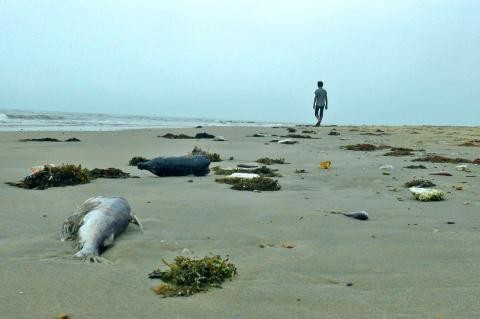Vietnam yesterday said a US$10.6 billion steel plant run by a unit of Formosa Plastics Corp (FPC, 台塑) caused an until-now mysterious environmental crisis by releasing toxic wastewater into the sea.
Formosa Ha Tinh Steel Corp (台塑河靜鋼鐵興業), which has built a new plant set to become the biggest of its kind in Southeast Asia, on Tuesday admitted responsibility for a disaster that caused massive fish deaths in coastal provinces in April, head of the government office Mai Tien Dung said.
The spill sparked public outrage across Vietnam and three successive weekends of protests, with demonstrators venting their fury at both Formosa and the government, accusing them of a cover-up.

Photo: AFP
Formosa had apologized and would provide US$500 million in compensation for those affected by the disaster, Dung said.
“Violations in the construction and testing operations of the plant are the causes for serious environmental pollution, killing a massive amount of fish,” Dung told a packed news conference. “Formosa has admitted responsibility for the fish deaths in four central provinces and committed to publicly apologize for causing severe environmental incidents.”
Formosa yesterday said the company respects the Vietnamese government’s probe and blamed the misconduct on oversight by its construction contractors in Vietnam.
The company expressed regret over the incident in a statement, saying it would work with the Vietnamese authorities to compensate the damage done to Vietnamese and solve the pollution issue.
The Ministry of Economis Affairs’ Department of Investment Services said it respects the agreement reached between Formosa Ha Tinh Steel and the Vietnamese government.
“We have contacted the Vietnamese Ministry of Foreign Affairs right after the release of the government’s investigative report this afternoon,” department Director-General Vivien Lien (連玉蘋) said by telephone, expressing the hope that the event would not affect the relations between Taiwan and Vietnam.
Lien said the Vietnamese Ministry of Public Security has promised the Taiwanese representatives in Vietnam that it will ensure the safety of Taiwanese in the nation following the incident.
Formosa’s steel plant is among the largest investments by a foreign company in Vietnam.
In April, the media reported that chemicals from a drainage pipe had killed fish, but a preliminary investigation by Formosa and a separate investigation by the Vietnamese government found there was no direct link between the steel plant and the deaths.
The initial government probe concluded the cause was either toxic discharge caused by humans or “red tide,” when algae bloom and produce toxins.
The incident sparked a crisis for the administration of Vietnamese Prime Minister Nguyen Xuan Phuc, who took office days after dead fish started washing up along a 200km coastline on April 6.
Additional reporting by Ted Chen and Lauly Li

Conflict with Taiwan could leave China with “massive economic disruption, catastrophic military losses, significant social unrest, and devastating sanctions,” a US think tank said in a report released on Monday. The German Marshall Fund released a report titled If China Attacks Taiwan: The Consequences for China of “Minor Conflict” and “Major War” Scenarios. The report details the “massive” economic, military, social and international costs to China in the event of a minor conflict or major war with Taiwan, estimating that the Chinese People’s Liberation Army (PLA) could sustain losses of more than half of its active-duty ground forces, including 100,000 troops. Understanding Chinese

The Ministry of Foreign Affairs (MOFA) yesterday said it is closely monitoring developments in Venezuela, and would continue to cooperate with democratic allies and work together for regional and global security, stability, and prosperity. The remarks came after the US on Saturday launched a series of airstrikes in Venezuela and kidnapped Venezuelan President Nicolas Maduro, who was later flown to New York along with his wife. The pair face US charges related to drug trafficking and alleged cooperation with gangs designated as terrorist organizations. Maduro has denied the allegations. The ministry said that it is closely monitoring the political and economic situation

UNRELENTING: China attempted cyberattacks on Taiwan’s critical infrastructure 2.63 million times per day last year, up from 1.23 million in 2023, the NSB said China’s cyberarmy has long engaged in cyberattacks against Taiwan’s critical infrastructure, employing diverse and evolving tactics, the National Security Bureau (NSB) said yesterday, adding that cyberattacks on critical energy infrastructure last year increased 10-fold compared with the previous year. The NSB yesterday released a report titled Analysis on China’s Cyber Threats to Taiwan’s Critical Infrastructure in 2025, outlining the number of cyberattacks, major tactics and hacker groups. Taiwan’s national intelligence community identified a large number of cybersecurity incidents last year, the bureau said in a statement. China’s cyberarmy last year launched an average of 2.63 million intrusion attempts per day targeting Taiwan’s critical

‘SLICING METHOD’: In the event of a blockade, the China Coast Guard would intercept Taiwanese ships while its navy would seek to deter foreign intervention China’s military drills around Taiwan this week signaled potential strategies to cut the nation off from energy supplies and foreign military assistance, a US think tank report said. The Chinese People’s Liberation Army (PLA) conducted what it called “Justice Mission 2025” exercises from Monday to Tuesday in five maritime zones and airspace around Taiwan, calling them a warning to “Taiwanese independence” forces. In a report released on Wednesday, the Institute for the Study of War said the exercises effectively simulated blocking shipping routes to major port cities, including Kaohsiung, Keelung and Hualien. Taiwan would be highly vulnerable under such a blockade, because it